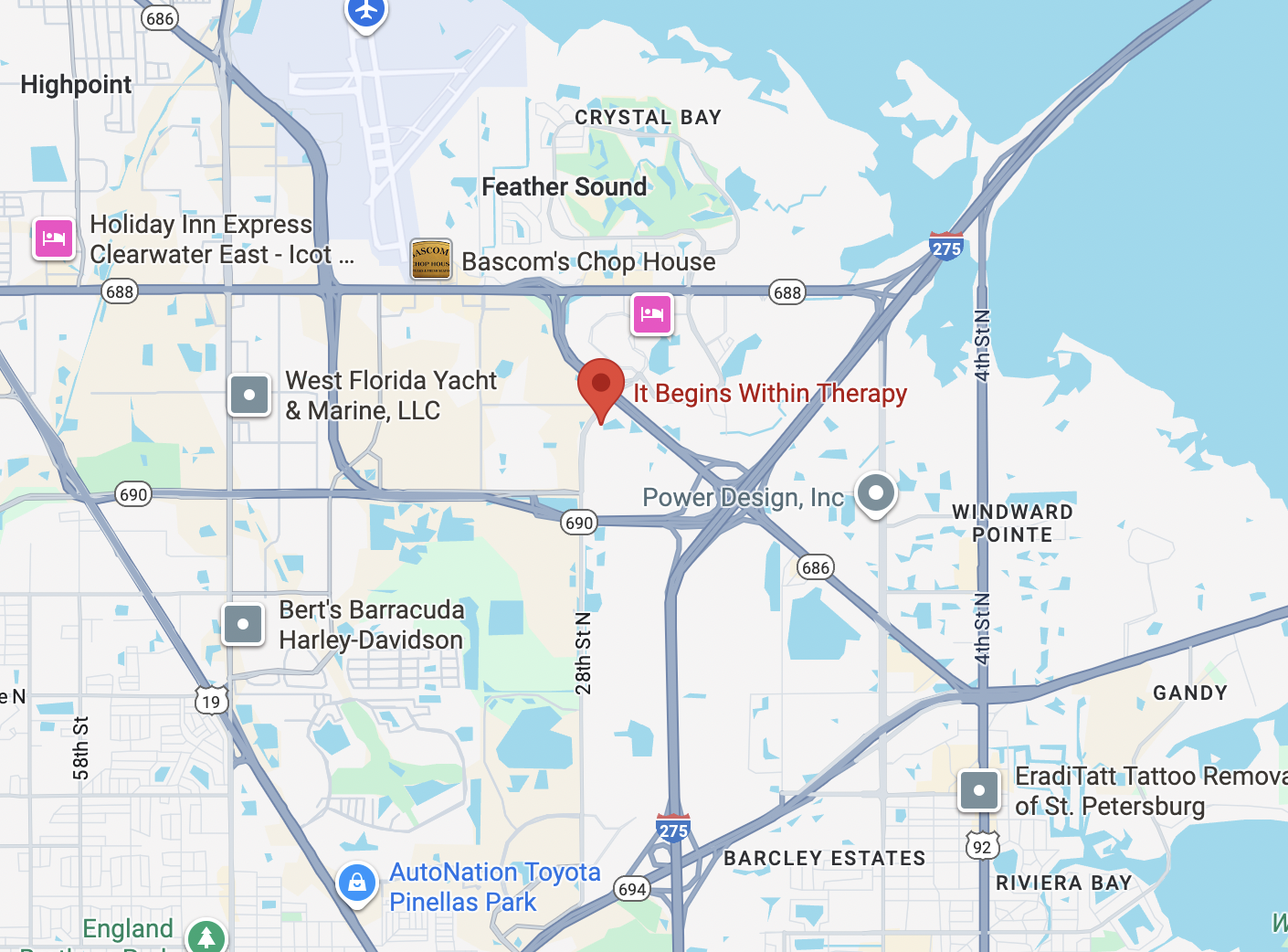Family Therapy in Tampa, St. Petersburg & Sarasota
Our family therapy services in Tampa & St. Petersburg provide a safe, supportive space to address conflicts, improve communication, and strengthen family bonds. Whether dealing with a life transition or unresolved tensions, our therapists can guide your family toward healing.
What is Family Therapy in Tampa, St. Petersburg & Sarasota?
Family therapy works by bringing together family members in a safe therapeutic setting to improve communication, resolve conflicts, and address communication problems. During guided therapy sessions, family counselors may use various techniques, such as role-playing, communication training, and behavioral interventions. With these various techniques, therapists are able to address the family’s specific issues and improve dynamics. Therapy sessions often involve all family members to ensure a comprehensive approach to resolving issues. At It Begins Within, a family therapy process typically involves an initial assessment, regular consistent sessions with assigned tasks or “homework,” and periodic evaluations to monitor progress. By focusing on the family as a system, therapy helps family members understand each other’s perspectives, develop healthier interaction patterns, and create a more supportive home environment.
What Family Therapy Helps With
Every family experiences stress, conflict, or disconnection at times. Family therapy gives parents, teens, and children a supportive space to slow things down, understand each other more clearly, and learn healthier ways of communicating—even when emotions run high.
Families often come to IBW for support with:
Teen–Parent Conflict & Communication Breakdowns
Arguments that escalate quickly, teens shutting down, or parents feeling unheard.
Anxiety, Stress & Emotional Overwhelm at Home
This includes tense routines, high expectations, school pressure, and emotional intensity in teens or younger children.
Behavioral Challenges & “Big Feelings” in Children
Childhood defiance, tantrums, perfectionism, emotional sensitivity, or difficulty following routines.
Blended Family Transitions & Co-Parenting Stress
Navigating step-parent roles, adjusting to new family routines, supporting children through change.
Divorce, Separation & Major Life Changes
Shifts in household schedules, new dynamics, or rebuilding trust during and after transitions.
Family Disconnection & Tension That Keeps Growing
Parents and children feeling distant, “walking on eggshells,” or stuck in repeated negative cycles.
Supporting Neurodivergent Children & Teens
Helping families build communication tools and routines that support ADHD, autism, or executive-functioning challenges.
No matter what your family is facing, therapy helps you create a calmer home, build healthier communication patterns, and reconnect in a meaningful way.
What to Expect in Family Therapy? The Family Counseling Process
Initial Assessment and Goal Setting
In the first session of family counseling, ideally we’ll have all participating family members to gather information about their concerns and dynamics. The initial assessment is conducted by licensed clinical social workers, counselors and marriage and family therapists who are trained in family dynamics. Initially the therapist or counselor will assess the family’s history, communication patterns, and specific issues, then collaboratively sets goals to guide the therapeutic process.
Developing a Treatment Plan | therapy for family problems
Based on the initial assessment, the therapist or counselor develops a customized treatment plan tailored to the family’s needs. This treatment plan will outline strategies and interventions for effective family counseling. Family members will identify and agree on short term and long term goals to improve their lives. The therapist also explains the session structure, frequency, and what each family member can expect.
Regular Therapy Sessions
Regular therapy sessions are scheduled, typically weekly or bi-weekly, based on the family’s needs and goals.
Techniques and Interventions: During sessions, the therapist will use various techniques and interventions, such as:
Communication Training - Teaching family members how to express themselves clearly and listen to each other effectively.
Role-Playing - Practicing different scenarios to improve problem-solving and conflict resolution skills.
Behavioral Strategies - Implementing specific strategies to address problematic behaviors and reinforce positive interactions.
Emotional Support - Providing a safe space for family members to share their feelings and experiences.
Relationship Issues - Addressing relationship issues to help family members improve their interactions and resolve conflicts.
Monitoring Progress and Adjusting the Plan
The therapist regularly checks in with the family to assess progress towards their goals, ensuring the therapy's effectiveness. Based on feedback, the therapist may adjust the treatment plan, including session frequency, techniques, or goals.
Family Reunification Therapy in Tampa, St. Petersburg & Sarasota
What is reunification therapy?
Reunification therapy is a form of family therapy where a child and parent have experienced estrangement due to divorce, custody issues, or other challenges. Many parents find reunification therapy helpful when their child feels hesitant or resistant to reconnect.
What problems does reunification therapy solve?
It addresses feelings of mistrust, fear, and confusion, guiding family members to safely express emotions, rebuild communication, and restore healthy relationships.
What to expect in reunification therapy
Collaborative sessions that include parents and children
Gradual, paced reintroduction activities to rebuild connection
Coaching on communication and emotional regulation skills
Support for navigating co-parenting challenges with confidence
If your family is ready to take this courageous first step, our compassionate therapists are here to help.
Why families choose it begins within for reunification
Our licensed therapists in Tampa and St. Petersburg specialize in family reunification counseling. What I wish every family knew is that rebuilding trust is a process — and therapy provides a safe, supportive space for this important work. We use evidence-based methods tailored to your family’s needs, whether in-person or via teletherapy.
Court Ordered Family Therapy in Tampa, St. Petersburg & Sarasota
At It Begins Within, we offer specialized family court therapy to support families through custody and visitation challenges. Our therapists provide neutral, confidential counseling designed to reduce conflict, improve communication, and promote the best interests of the child.
Services include:
Therapeutic sessions for parents and children involved in court cases
Assistance with court-mandated evaluations and reports
We help parents, caregivers and families navigate family court with confidence and compassion.
Meet Our Family Therapists in Sarasota, St. Petersburg & Tampa
Situated near Westshore and extending services to families in South Tampa, Hyde Park, Carrollwood, and Apollo Beach, our Tampa family therapists at It Begins Within are dedicated to helping parents and children overcome communication hurdles, reduce conflicts, and foster closeness. Many Tampa families turn to us during high-stress periods, such as career demands, heightened emotions at home, or teens facing anxiety and shutdowns. We utilize proven methods like CBT, DBT, family break old cycles and create calmer, more connected routines, along with parent coaching to empower caregivers.
At It Begins Within Therapy, our St. Petersburg family therapists specialize in supporting parents, teens, and children across Pinellas County, including Downtown St. Pete, Snell Isle, Old Northeast, Treasure Island, and Gulfport. Whether your family is navigating communication breakdowns, emotional withdrawal in teens, or rising tensions at home, our licensed clinicians help build healthier family dynamics through evidence-based approaches like family systems therapy and emotional regulation techniques. We focus on reconnecting frustrated teens with their families, fostering trust, and creating lasting positive changes.
Our Sarasota office at It Begins Within Therapy supports families throughout Sarasota County, including Lakewood Ranch, Palmer Ranch, Siesta Key, and University Park—especially during times of transition or conflict. We assist parents, teens, and children in breaking through communication barriers, managing emotional highs and lows, and rebuilding trust with tailored strategies like systemic family therapy and skill-building sessions. Whether dealing with teen withdrawal, family anxiety, or outdated patterns, our experienced therapists guide you toward calmer, more unified home environments.
Family Therapy for Today’s Complex Family Dynamics
Every family system is different. At It Begins Within, our family therapy services are designed to support families navigating transitions, developmental stages, and relational stress—while meeting each family member where they are emotionally and developmentally.
Blended Family & Stepfamily Counseling in Tampa, St. Petersburg & Sarasota
Blended families face unique challenges such as new roles, shifting boundaries, co-parenting stress, loyalty conflicts, and differing parenting styles can all create tension within a home.
Our therapists work with stepfamilies and blended households everyday to resolve tension and conflict, build trust over time, and, clarify expectations. Whether you’re early in the transition or navigating long-standing conflict, blended family counseling can help create stability, reduce power struggles, and support healthier relationships across the entire family system.
Family Therapy with Specialized Support for Children
When children struggle, the entire family feels it. Behavioral challenges, anxiety, ADHD, or big just overwhelming big emotions can often show up first in children, but the roots are usually relational and systemic within the family unit.
Our family therapy approach includes age-appropriate, evidence-based support for children while actively involving parents and caregivers. Therapists help families understand what a child’s behavior is communicating, build consistent routines, and strengthen connection through healthier interaction patterns. This collaborative model helps parents feel more confident and children feel safer and better understood.
Family Therapy for Teens & Adolescents
Supporting your children through their teenage years can be one of the most challenging seasons for a family. Teens are working toward independence while still needing structure, safety, and understanding—often leading to conflict at home.
Family therapy for teens focuses on improving communication, rebuilding trust, and helping parents stay involved without breaking the therapeutic relationship. Our therapists support families navigating anxiety, mood changes, academic stress, peer issues, identity development, and emotional regulation. Sessions are structured to respect a teen’s voice while strengthening the family’s ability to work as a team during this critical developmental stage.
Common Reasons That Bring Families in for Therapy
-
Families experiencing frequent arguments, misunderstandings, or unresolved conflicts can learn healthier ways to communicate and resolve disputes.
-
When a family member is dealing with a mental health condition like depression, anxiety, or OCD, family counseling can help the entire family understand the condition and learn how to support their loved one.
-
Families affected by substance abuse can benefit from therapy by addressing the impact of addiction on the family dynamics and developing strategies for support and recovery.
-
Significant changes like divorce, remarriage, or moving to a new place can be stressful. Family therapy can help members navigate these transitions and adjust to new roles and situations.
-
Families dealing with the aftermath of a traumatic event or the loss of a loved one can find support and healing through family therapy.
-
Parents and siblings can learn effective strategies to address and manage behavioral problems, improving family relationships and overall functioning.
Benefits of Family Counseling in Tampa
Family counseling is a collaborative and dynamic process that requires commitment from all members. By working together with a skilled therapist, families can overcome challenges, improve their relationships, and achieve greater harmony and well-being.
Common outcomes that our clients achieve are:
Improved Communication: Families learn how to communicate more effectively, reducing misunderstandings and conflicts.
Strengthened Relationships: Therapy helps family members understand and support each other, leading to stronger bonds.
Conflict Resolution: Families develop healthy ways to resolve disputes and handle disagreements.
Support and Understanding: Therapy provides a space for family members to express their feelings and experiences, fostering empathy and support.
Types of Family Therapy We Offer
Our family therapists are trained in a range of evidence-based approaches designed to address diverse challenges faced by families. We offer a free consultation with one of our counselors to help you understand how each therapy approach can be tailored to meet your family’s unique needs.
Here are some of the specialized family therapy types we provide:Structural Family Therapy
Structural Family Therapy focuses on reorganizing family roles and boundaries to improve communication and resolve conflicts. Ideal for families experiencing power struggles or role confusion.
Bowen Family Therapy emphasizes understanding multigenerational patterns and emotional interdependence to promote healthy family functioning and individual growth.
Systemic Family Therapy Services view the family as a complex system and works on changing interaction patterns to improve relationships and resolve problems.
Emotionally Focused Couples Therapy helps family members identify and express emotions to strengthen attachment bonds and foster emotional connection.
Solution-Focused Family Therapy concentrates on identifying strengths and solutions rather than problems, encouraging families to build positive changes quickly.
How Can You Encourage a Family Member to Attend Family Therapy?
You may encourage a loved one to participate in therapy, expressing your concern and showing how a therapist can assist the couple in managing the problem together. The external perspective can make a person feel more understood and can provide a new skill set. Family counseling may be beneficial in reducing stress in the family.
8 tips for approaching family members about therapy
Choose the Right Time and Place: Select a time when everyone is relaxed and can talk privately without interruptions, avoiding bringing up therapy during or immediately after a conflict.
Express Your Concerns with Empathy: Use “I” statements to convey your feelings and concerns, like “I’ve been feeling really stressed about our recent arguments, and I think talking to a therapist could help us understand each other better,” and clearly explain why you believe therapy could benefit the family.
Highlight the Benefits: Emphasize that therapy can enhance family communication and resolve conflicts, mention how therapy can strengthen relationships and create a more supportive environment, and stress that a therapist provides valuable tools and strategies without bias.
Address Misconceptions and Fears: Explain that therapy is a common and helpful resource for many families, not just those in crisis, provide a brief overview of what family counseling involves to reduce fear of the unknown, and calmly and thoughtfully address any fears or reservations about therapy.
Involve Everyone in the Decision: Encourage everyone to share their thoughts and feelings about attending therapy, and show respect for each family member’s opinion, avoiding pressuring anyone into agreeing.
Suggest a Trial Period: Propose trying therapy for a few sessions to see how it goes, making the idea feel less daunting, and agree to reassess as a family after a few sessions to decide if you want to continue.
Provide Resources and Information: Share articles, books, or videos about the benefits of family counseling, and provide information about potential therapists, including their qualifications and approach.
Be Patient and Persistent: Allow family members time to process the idea and come to their own conclusions, and bring up the topic again if needed, gently reminding them of the potential benefits.
What Kind of Therapy is Best for Family Issues?
When it comes to addressing family challenges like communication breakdowns, parenting struggles or ongoing unresolved conflict, family therapy can be a highly effective approach. Unlike individual therapy, family counseling brings the whole family together to explore dynamics, improve relationships, and develop healthier ways of interacting. Regarding the specific approaches, we use evidence-based modalities like Systemic Family Therapy and Structural Family Therapy, which aim to restructure family roles and boundaries.
While there are a variety of approaches which can be highly effective, the “best” kind of therapy will vary based on the specific challenges the family is facing, the personalities and individuals within the family, and the existing dynamics. Our Family Therapists in Tampa & St. Petersburg use a personalized approach (or combination of multiple approaches) to create a treatment plan that will be best for your specific situation.
Recognized as the Best Family Counseling in Tampa & St. Petersburg
We offer comprehensive mental health services for families andare dedicated to the best outcome for our clients. Please reach out to us today to book a session with one of our skilled family therapists.
















